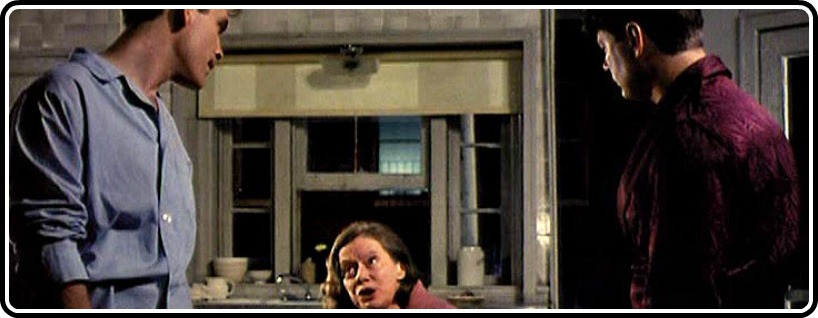In the world of made for TV cinema, the lower the bar is set, the likelier it will be met. However, with Hallmark films and ABC Family life-affirmers coming a dime a dozen (as anyone with a TV set will tell you, what with the cavalcade of Christmas-focused features hitting the boob tube just a handful of weeks ago), even the lowest bar can be shimmied under, making the stigma of “straight to TV” about as negative as “straight to DVD.”
Hell, at least some straight to DVD films have a good cast.
Joking aside, this stigma doesn’t hinder all films made for the small screen. Take one from the man behind such films as The Tin Drum, for example.
That’s right. Back in 1985, CBS tapped director Volker Schlondorff to helm an adaptation of the iconic Arthur Miller play, Death Of A Salesman, and got some mighty big names to fill his cast.
Salesman tells the story of Willy Loman, who after returning home from yet another exhausting business trip, sees his world turn upside down. His kids seem to have only dreams in their heads instead of drive in their hearts, and following a recent car crash, his mortality has become to weigh like an anchor upon his shoulders. Starring the likes of Dustin Hoffman, Kate Reid, and the startlingly young looking pair of Stephen Land and John Malkovich, Death Of A Salesman is a Masters class in style and cinematic experimentation, while also having the ability to teach a few people today about heartbreaking melodrama.
A master filmmaker who is still working at the top of his game today (his latest film Calm At Sea is making the festival rounds), Schlondorff is brazen here. Setting the film seemingly in a rehearsal space for a local theater troupe, the film doesn’t hold back on its stage trappings. Be it wide shots showing off the film’s beautifully crafted sets or driving sequences that are as thrilling to watch without actual forward motion as any car chase in action cinema, Schlondorff’s film is lavishly crafted and gorgeously directed by an on-his-A-game Schlondorff.
Shot by Michael Ballhaus (an oft-collaborator with Martin Scorsese on films like The Departed or the director’s upcoming Sinatra), the film’s style may be its strongest suit. Seemingly drifting in and out of a dreamlike, flowing aesthetic, the picture both adds a distinct sense of style to a narrative that is so hellishly melodramatic. The lush visuals add a sense of period and drama to the picture, one that instead of asking for its aesthetic to carry it, posits that a stage drama like this deserves a plaintively surreal technique to pair alongside it. Every color pops off the screen here, be it the rustic exterior shots of the sons tossing a football around, or the hazy car sequence that opens the picture, and is about as enthralling visually as the story and performances are emotionally.
Speaking of performances, this has a trio of brilliant ones.
Led by Dustin Hoffman, the film is an utter body blow to that big thing inside the left side of your body. Hoffman imbues the character of Willy with a great deal of both anger and sadness, where you feel as though they are ultimately results of one another. Willy is one of the great tragic characters, a man who has too many dreams to ever make true, and too much pride to say so. His interchanges with Reid are startling, and their relationship is one full of drama with tinges of knowing emotional abuse. Malkovich and Lang are fantastic here as well, and even better together. Like any pair of siblings, they play into one another perfectly, and yet the two just can’t seem to understand their parents. Unwilling to hear what the sons have to say, Willy and his wife Linda have only the highest of hopes for their spawn, without realizing that the world is changing, and it takes more than a name or, in the case of Willy, a history.
A melodrama in its heart, and a meditation on slow death of the American Dream, as well as familial conflict, in its soul, Volker Schlondorff’s Death Of A Salesman is simply one of the best made-for-TV films ever made. Featuring a director at the very height of his directorial power, and performances that seem almost career defining, Death is a heartbreaking melodrama that seems to be still inspiring directors today. Seeming like a distant relative to a film like last year’s Anna Karenina, this is a breathtaking mix of style and some emotionally devastating substance. A tough film to hunt down, this could more than gain from a good Criterion DVD/Blu-ray release. One can only imagine what this would look like with a good transfer.




![Bergman Island (The Criterion Collection) [Blu-ray]](https://criterioncast.com/wp-content/uploads/2022/11/bergman-island-the-criterion-collection-blu-ray-400x496.jpg)
![This Is Not a Burial, It’s a Resurrection (The Criterion Collection) [Blu-ray]](https://criterioncast.com/wp-content/uploads/2022/11/this-is-not-a-burial-its-a-resurrection-the-criterion-collection-blu-ray-400x496.jpg)
![Lars von Trier's Europe Trilogy (The Criterion Collection) [The Element of Crime/Epidemic/Europa] [Blu-ray]](https://criterioncast.com/wp-content/uploads/2022/11/lars-von-triers-europe-trilogy-the-criterion-collection-the-element-of-400x496.jpg)
![Imitation of Life (The Criterion Collection) [Blu-ray]](https://criterioncast.com/wp-content/uploads/2022/11/imitation-of-life-the-criterion-collection-blu-ray-400x496.jpg)
![The Adventures of Baron Munchausen (The Criterion Collection) [4K UHD]](https://criterioncast.com/wp-content/uploads/2022/11/the-adventures-of-baron-munchausen-the-criterion-collection-4k-uhd-400x496.jpg)
![Cooley High [Criterion Collection] [Blu-ray] [1975]](https://criterioncast.com/wp-content/uploads/2022/11/cooley-high-criterion-collection-blu-ray-1975-400x496.jpg)